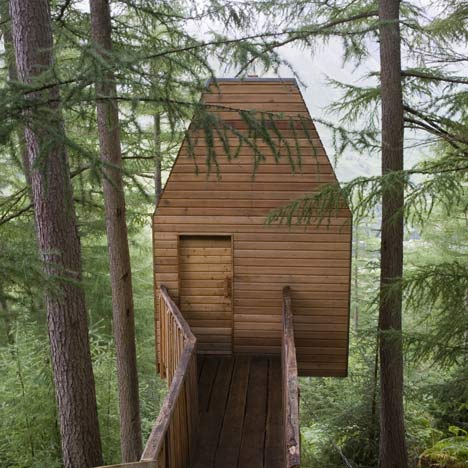
Outlandia by Malcolm Fraser Architects
Edinburgh studio Malcolm Fraser Architects have completed this wooden treehouse housing an artists' studio in Glen Nevis, Scotland.
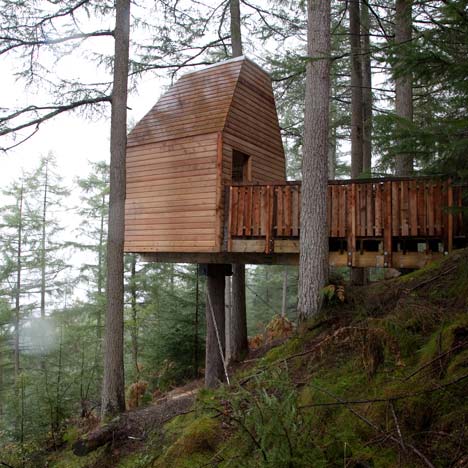
The wood-panelled structure sits atop a pillar and is reached via a bridge.
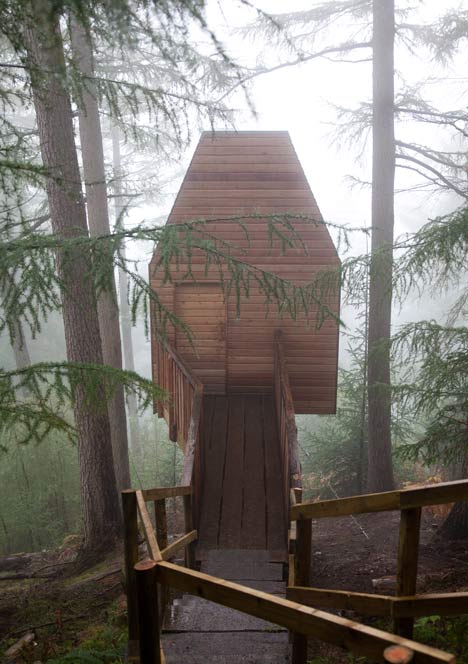
A meandering wooden walkway leading out from the hut nestles into the sloping landscape.
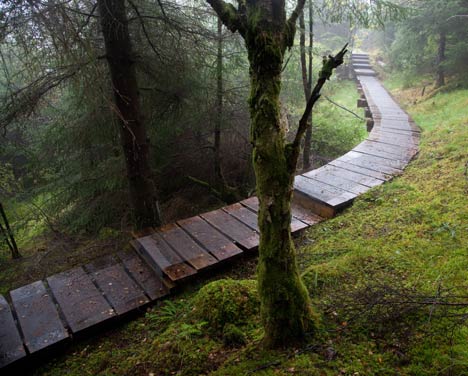
Called Outlandia, the project was commissioned by art and architecture collective London Fieldworks.
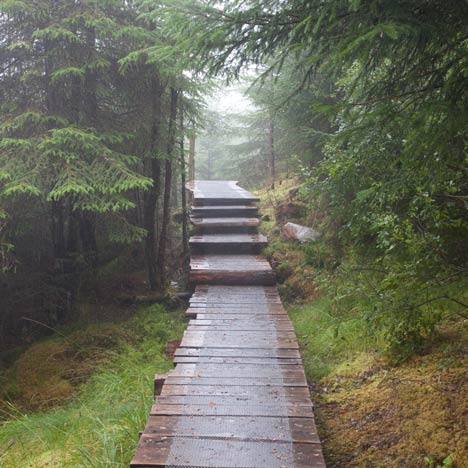
The structure is made partly of trees that were cut down to clear the site.
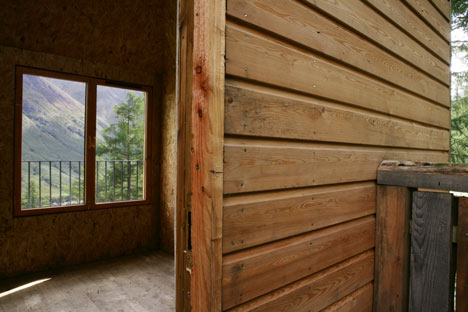
See also:
Spontaneous City in the Tree of Heaven by London Fieldworks
Tree Hotel by Tham & Videgård Arkitekter
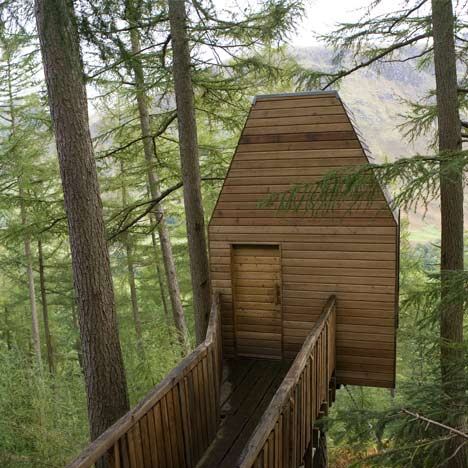
Here's some more information from London Fieldworks and the architects:
Edinburgh studio Malcol, Fraser Architects have completed a treehouse in Glen Nevis, Scotland,
Outlandia is an off-grid treehouse artist studio and fieldstation in Glen Nevis, Lochaber, Scotland. A flexible meeting space in the forest for creative collaboration and research. Imagined by artists Bruce Gilchrist and Jo Joelson (London Fieldworks) and designed by Malcolm Fraser Architects, Outlandia is inspired by childhood dens, wildlife hides and bothies, by forest outlaws and Japanese poetry platforms.
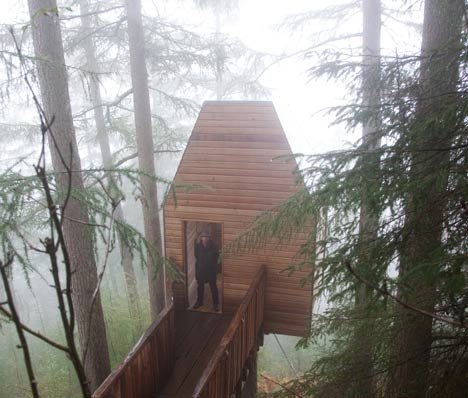
It is located in a copse of Norwegian Spruce and Larch on Forestry Commission land, at the foot of Ben Nevis in the Scottish Highlands. “Construction was part-joinery, part-forestry and part-mountain rescue, with a local contractor who nicely combined all three, and an unusual set of Risk Assessments”.

Outlandia is an artist-led project, built in 2010 to foster links between creativity and the environment; a multi-purpose platform for the use of local and invited artists. London Fieldworks were invited by the Highland Council to make a proposal to celebrate the Year of Highland Culture that would create a lasting contemporary art legacy for the Fort William area. Outlandia is the outcome, a platform from which to consider creative responses to the environment. The proposal was inspired by London Fieldworks' previous experience working in Lochaber: whilst there is an abundance of artistic talent and creativity in the Highlands there are few dedicated contemporary arts facilities in Fort William or in the surrounding area.
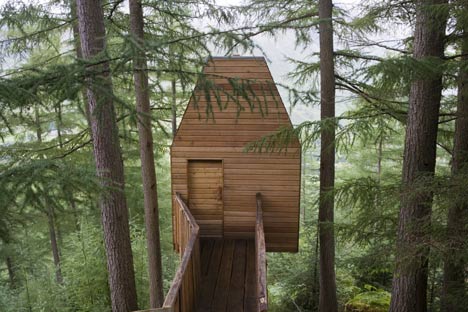
The Outlandia project is sensitive to the shifting ecology between human population, industry and landscape. The site is on Forestry Commission land overlooking the southwest facing side of the glen with its ancient, native trees. This context makes explicit the dichotomy within a landscape under pressure to function as an area of outstanding natural beauty (the area has been branded Outdoor Capital of the UK) as well as a resource for society's raw materials - a schism common to many rural communities. During its time of service, Outlandia will provide a multi-purpose platform for the use of diverse community groups as well as selected artists and researchers. Outlandia is in line with The Scottish Forestry Strategy that aims to create opportunities for more people to enjoy trees, woods and forests in Scotland, and to help communities benefit from woods and forests.
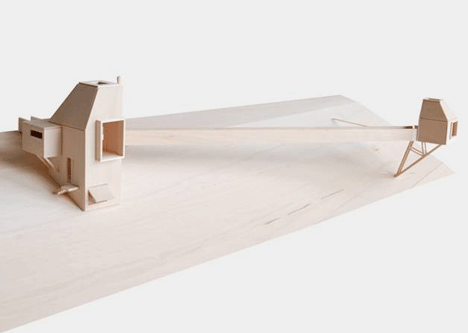
OUTLANDIA: PROJECT DESCRIPTION
By Malcolm Fraser
The Project Brief was nice and loose: an artists’ fieldstation in Glen Nevis, to allow and encourage creative interaction between artists and the land, its history and people.
The site was even looser: somewhere in Glen Nevis. Where, exactly, grew out of a complex negotiation with partners, landowners and the local authorities, which brought to the surface some interesting tensions – a portion of the climbing fraternity, for instance, believes that hills should be for serious craggies only, and that artists should be kept away. On the ground, the choice of site grew out of long crawls through wet undergrowth and up wooded slopes, in clouds of midges and carpets of pine needles, in search of natural and human drama.
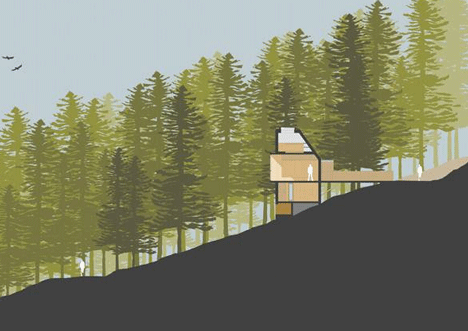
The site chosen is full of it. Sitting half-way up the opposite side of the Glen to Ben Nevis, a visitor approaches Outlandia through the path we cut through the dense woods behind, descending out the musty dark of the trees into a big view which, from dark-to-light and framed by old, tall larches, opens-up across the Glen to the shoulder of the Ben. The view of great nature dazzles, but we soon start to see the multiplicity of human interaction with it: the routes threading across the view, from the main road and West Highland Way along the foot of the Glen to the tourist route up the Ben, with its strings of tiny bobbling hats working their way up the hill; the car parks, caravan parks and visitor centre, places of the modern tourist trade; the old mills and older burial mounds, traces of more ancient useage; and the great industrial aluminium smelter across the Glen and the hydro that powers it.
Nothing could be further from the idea of the Highlands as “unspoilt wilderness”. We have long been part of this landscape, and it seems unlikely that any artists making work for, from or aound Outlandia would fail to enjoy and illuminate the tensions around nature, industry, tourism and heritage.
The building itself sits out from a 45 degree slope: a treehouse, part-built out the trees cut down to form the site, entered across a bridge from the slope behind; a simple box, leaning-out into the view with big windows opening-up to it. Part of the building of it was a low-impact, eco-friendly use of material recovered from the site; part the opposite, high-impact and hairy landings of concrete, for the foundations, from a helicopter. Construction was part-joinery, part-forestry and part-mountain rescue, with a local contractor who nicely combined all three, and an unusual set of Risk Assessments.
London Fieldworks commissioned Outlandia and are curating the work in and around it.
See also:
.
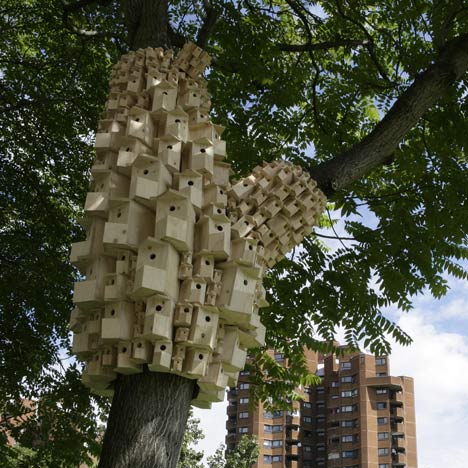 |
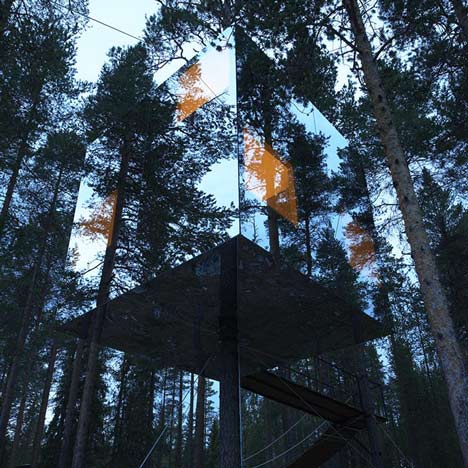 |
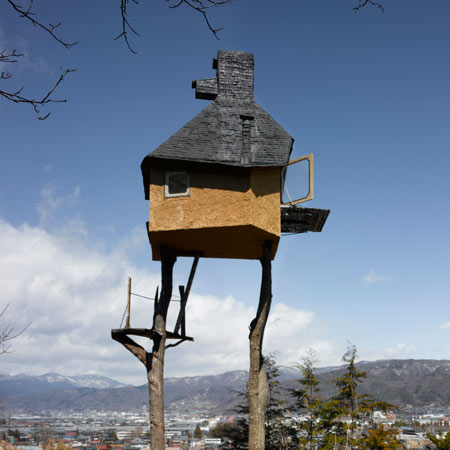 |
| Spontaneous City by London Fieldworks |
Tree Hotel by Tham & Videgård Arkitekter |
Takasugi-an by Terunobu Fujimori |